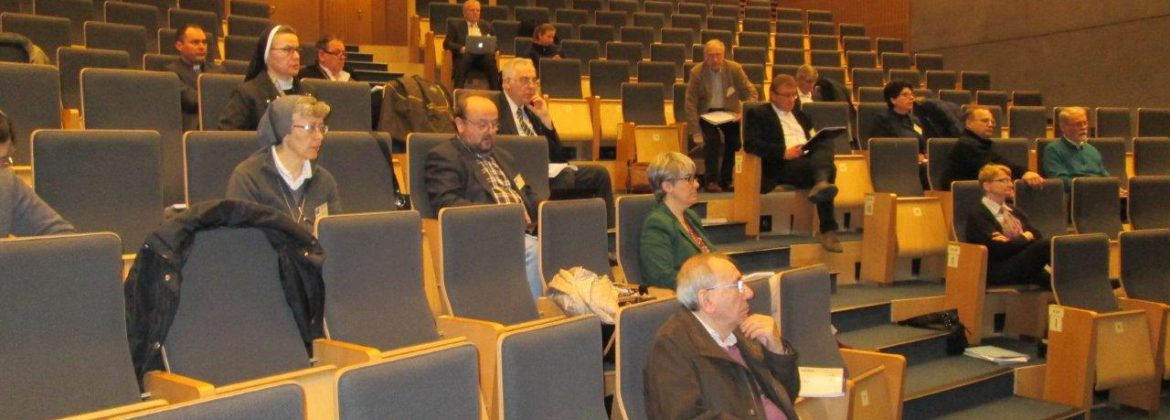XVII. Conference of the European Forum for Religious Education in Schools
Religious education in schools as accompanying on the road to Emaus
European society between fast changes and Christian identity.
Katowice (Polonia), March 30th –April 3rd 2016

- Nowadays, the religious condition of young people and their predisposition to interiority and spirituality are widely different with regard to the geographical and cultural context (e.g., countries such as Ireland, Italy or Poland can not be compared to other countries of EU), but also the inner life of each young person is deeply fragmented. Young people do not always know how to express their desire for a fully realized life; they are quite often sad and disenchanted, sometimes cynical and desperate. They seem “to escape from the world of firm faith”, just like the two sad and doubtful disciples of Emmaus who, after the death of Jesus, left Jerusalem, symbol of the “firm faith” they previously held (cf. Lk 24,13ss).
- Nevertheless, many young people are still inhabited by the aspiration to the Good, the Beautiful, the True (values, ideals, hopes, life goals …), although this desire remains often confused, unexpressed, not adequately understood by themselves and not adequately accompanied by adults. Precisely for this reason, we are aware of our responsibility: we want to offer them these noble ideals and give them a reason of our evangelical hope (cf. 1Pt 3:15).
- Two tasks are quite urgent to properly accompany the young people in their growth: 1) help them to “tune spiritual aerials”, so that they can listen to their inner voice, better understand their unhappiness and express their quest of happiness more effectively; 2) provide them “communication channels” (just to remain with the metaphor of the “aerials”), that is living human, spiritual and religious experiences and content, such that they may perceive them as interesting and engaging, relevant to their world and their experiences.
- The Church is both communio and ministratio (cf Lumen Gentium, n. 4), that is full membership to the ecclesial mystical body, and also dialogical opening and service to the world. The fraternal meeting with those who are not fully sharing the communion with the Church is an essential element of the mystery of the Church. So, it would not be ideal to introduce in school the practice of the sacraments of faith, that are connected with a full ecclesial communion; but it would be fitting to offer such “expanded sacramental signs”, that is symbols or acts indirectly able to suggest the search for transcendence and the openness to the spiritual dimension of life.
- Such accompaniment within RE in schools should be progressive and organically structured. It would be self-defeating to begin the lessons with the doctrinal or the moral aspects of religious life. First of all, it is necessary to meet their inner world (with artistic and aesthetical experiences, sharing “their” music, emotional education, etc.), and only at a later time help them to find in their own experience the way to reach what is “beyond” (spirituality / transcendence / encounter with God). Otherwise, they will not say, as the Emmaus disciples said to the unknown Companion, “Stay with us…” (Lk 24:29), but: “Go, please: I don’t need you anymore…”.
- Therefore, as RE tuitions are in the public school curricula, the proposal here suggested cannot be a “spiritual guidance” in the traditional sense, but rather a pedagogical methodology fitting to the school context, aimed at getting the students to discover at school (as far as is possible) those basic religious experiences they often lack either in their families, or in their Christian communities.
- It is therefore necessary to reset a better co-relation between RE in schools and youth ministry, recognizing their difference as well as their complementarity.
- In this process, the role of Religious Educators is crucial: although they should not be properly catechists – in a school context –they are nevertheless called to be, everywhere, a witness of their faith.
- The teacher should not think of himself or herself as just a “caregiver”, but he or she should also feel himself or herself cared for or “accompanied” by others. We insist once again on the duty of all RE teachers to care for their own lifelong learning, even with regard to their spiritual life.
- The experience of human fragility can often offer the opportunity to be a better person: the “limit experiences” (Grenzerfahrungen) can become “experiences of transcendence” and lead young people to, eventually, understand the meaning of human life. Therefore a scholastic accompaniment process should promote experiences of frailty, disease, poverty, helping the students to find in these practices a richness which can really fulfil the meaning of their life. We recommend, e.g., the proposal of PILGRIM (www.pilgrim.at) which aims to recognize the frailty of creation, and to accept it responsibly; many experiences of RE which attend to students affected by autism or other disabilities; more generally, any educational approach that emphasizes the responsible care of the weakest and vulnerable ones.
Katowice, April 3th 2016

